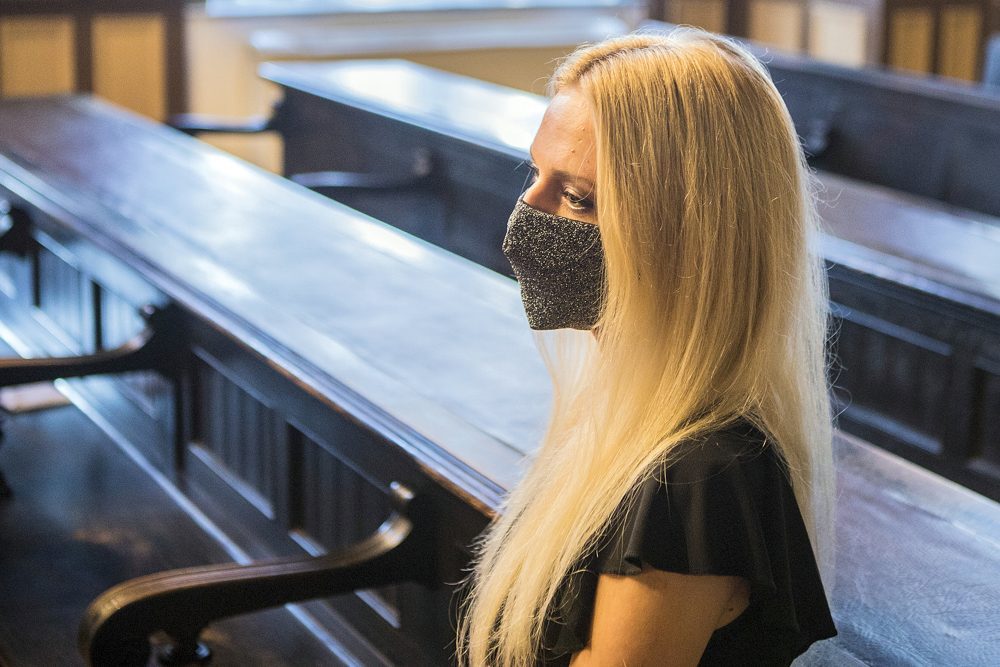Slovenia – Woman who sawed off her hand for $1M found guilty of fraud
Would you give up your hand for $1 million?
A Slovenian woman and her boyfriend have been sentenced to prison for attempted insurance fraud, after she deliberately cut off her hand in hopes of claiming more than 1 million euros ($1.56 million) in insurance payouts last year.

Julija Adlesic, 22, appeared in a Ljubljana courtroom to hear the verdict on Friday. She kept her reattached hand under a blanket throughout the sentencing hearing, which attracted widespread attention in Slovenia.
The judge slapped Adlesic with a two-year prison term for attempted fraud. She also handed Adlesic’s boyfriend a three-year prison sentence for his role in the scheme, and gave the boyfriend’s dad a one-year suspended sentence.
The bizarre case dates back to 2018 when Adlesic took out five separate insurance policies on herself. She then sliced off her left hand at the wrist with a circular saw in early 2019. The boyfriend and his father brought Adlesic to the emergency room without the hand to ensure it would not be reattached, prosecutors said. They claimed she’d cut it off while cutting tree branches.
Police went to her home and recovered the severed hand just in time for it to be sewn back on.
The court found that Adlesic’s boyfriend had looked up artificial hands shortly before the amputation took place. They argued that his search history proved it was a deliberate act, and that he’d talked Adlesic into giving up her left hand for $1 million.
Adlesic had argued throughout the trial that it was an accident, and that she would never have deliberately amputated her hand.
“No one wants to be crippled,” she said during the trial, according to Sky News. “My youth has been destroyed. I lost my hand at the age of 20. Only I know how it happened.”
Written By Josh K. Elliott Global News
SPAIN – Police Rumble “Crash for Chash” Insurance Scam in Spain’s Malaga
Police have made 17 arrests in total in a gang dedicated to faking car accidents to claim compensation from unsuspecting insurance companies. The intricate scheme involved many facets that ranged from fake ‘damage inspectors’ to fabricated medical certificates.
Police were alerted to the gang when an unnamed insurance company enlisted the help of an accident investigator to look into a potentially fraudulent case. During the investigations a video emerged that broke open the case of a gang of expert fraudsters and led police into a rabbit hole of crash for cash operations. The video showed an unnamed man at the wheel of a car outside a garage in the Cartama area of Malaga, repeatedly driving into another stationary car. It emerged that the man was an expert in recreating exact cosmetic damage on vehicles to match forged incident reports. Upon identifying the man thanks to the branding of the workshop shown in the video, police discovered a network of criminals behind the spike in insurance claims across the city. As details of the schemes were revealed, the intricacy of the operation became clear. The gang would recreate damage on specific vehicle in a deliberate an accurate way, then they would “hire” a damage assessor to review the damage and sign it off in an official document. In the accident report, police noticed that the accidents happened usually during holiday periods, where there was very few cars on the road, but the cars would always contain many passengers to maximize payouts. Members of the gang would also admit themselves into hospital to gain fake medical certificates for injuries supposedly sustained during the accident.
Eventually police performed raids on a number of properties in the Cartama area of Malaga and arrested 17 individuals, all Spanish and ranging between 18 and 58 years old.
Germany – Insurance Fraud: One Hand for Millions
In order to claim a sum insured in the millions, a man had his hand deliberately cut off by a train. How could the court not believe the claimant’s version of the accident?

A 45-year-old man was sentenced to two and a half years in prison for fraud in the Dortmund / Germany district court. The judges considered it as proven that the defendant was trying to collect millions by committing insurance fraud.
Crocodile and nail boards
As the WDR television reports, the claimant was a professional player who had insured his hand with various accident insurance companies for around six million euros. The very same hand was then alleged to have been severed by a train. The defendant alleged that it was an accident and that he wanted to cross the tracks and stumbled into the path of the train. The court did not believe this account of events because for one reason the claimant had a history of taking out an unusually large number of accident insurance policies. In addition, in 2014, the man claimed that a crocodile had bit his hand while on vacation in Australia. However, it turned out that the man had inflicted the injuries on himself using two nail boards.
Whilst this is a particularly bizarre case, it does shows the unbelievable lengths to which a fraudster will go in their attempt to defraud insurance companies.
Switzerland – Number of suspected Covid bail-out fraud cases explodes
Remarkable article by Swissinfo.ch about the abuse of Covid-19 bailout loans for companies.
Switzerland is investigating more than 4,500 cases of suspected abuse by companies claiming emergency bailout loans during the coronavirus pandemic. The number of suspect claims has increased five-fold since late summer and now covers CHF1.2 billion ($1.3 billion).
EUROPOL – INTERNET ORGANISED CRIME THREAT ASSESSMENT (IOCTA) 2020
Interesting publication about internet crime published on the EUROPOL Webpage.
The IOCTA is Europol’s flagship strategic product highlighting the dynamic and evolving threats from cybercrime. It provides a unique law enforcement focused assessment of emerging challenges and key developments in the area of cybercrime. We are grateful for the many contributions from our colleagues within European law enforcement community and to our partners in the private industry for their input to the report. Combining law enforcement and private sector insights allows us to present this comprehensive overview of the threat landscape.
The data collection for the IOCTA 2020 took place during the lockdown implemented as a result of the COVID-19 pandemic. Indeed, the pandemic prompted significant change and criminal innovation in the area of cybercrime. Criminals devised both new modi operandi and adapted existing ones to exploit the situation, new attack vectors and new groups of victims.
